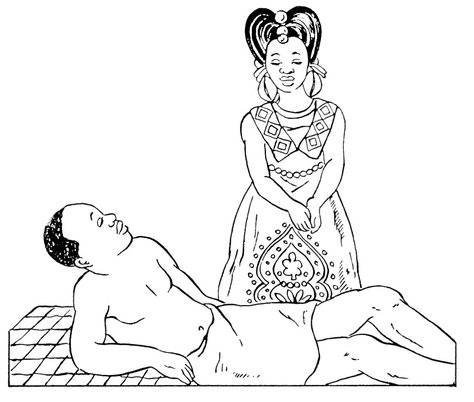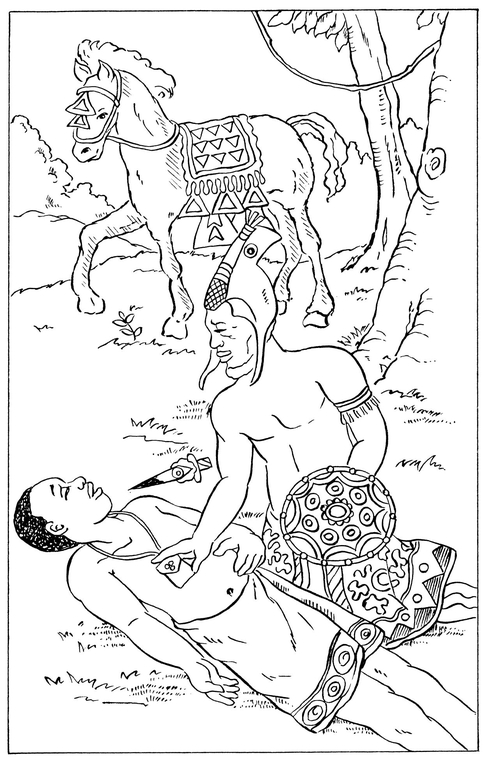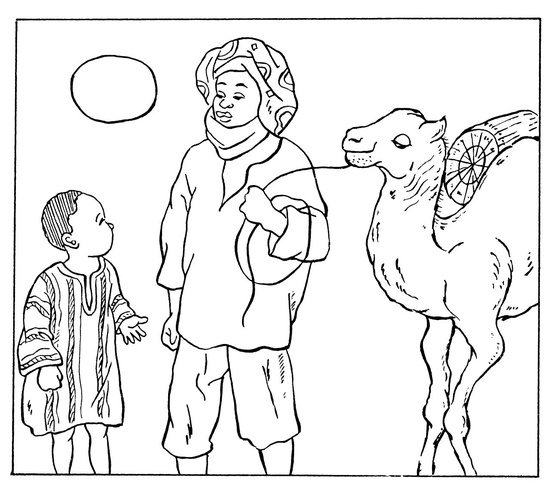African Folk Tales (5 page)
Read African Folk Tales Online
Authors: Hugh Vernon-Jackson,Yuko Green
L
ONG AGO there lived a man called Mullum. He was a great soldier, and he was the leader of all the soldiers in his country. He was respected in his own country and he was feared in all the neighbouring countries.
One day Mullum went out hunting on his war horse, a black animal, and, like his master, very strong and brave. The war horse was also a great jumper, and could leap over rocks and streams. Mullum naturally valued him very much.
Now on the day that Mullum went hunting he saw no animals at all. Because of that he went farther and farther away from his town, and deeper and deeper into the forest. He went so deep into the forest that unknown to him he left his own country and went into the country of his enemies.
As he had travelled a long way, Mullum grew tired. Dismounting from his horse, he put a piece of rope between the horse's front legs so that it could not go far away. Then he lay down in the shade of a tree with many leaves and went to sleep.
It happened that some of the enemies of Mullum were also out hunting in the forest on that same day. Suddenly they saw Mullum's horse which had wandered away from its master while searching for green grass to eat. Seeing a horse with no one beside it, the men tried to catch it, but even with its front feet tied close together, the horse was too savage and strong for them, and the men hurried back to their town.
“Come quickly to the forest!” they cried when they saw their brothers in the town. “There is a very mighty black horse which we want to catch.”
They returned to the forest with many of the bravest men of their town. There was a great fight, but at last the large number of men were able to catch the horse, and they led it back to their town, where it was taken to the palace of the king.
“May your life be long,” the men with the horse greeted their king. “See, we have captured a fine black horse.”
“I see it,” said the king, “and I am overjoyed. This is the horse of Mullum, my enemy. Without his best horse, Mullum will not be able to fight so well.”
The king gave orders that the horse should be tied up in the palace courtyard and be given freshly cut grass.
Now all this time, Mullum had been asleep. When he woke up, he could not find his horse. He looked all around him and he called, but in vain. Then he saw a man who was collecting wood.
“Greetings to you,” said Mullum to the man who was collecting wood. “Have you seen my horse?”
The man had seen the horse being caught, but he did not like to say so. All he said was that he thought the horse had been taken to the near-by town. Mullum then realized that he was in the country of his enemies.
“Run to the town,” Mullum ordered the man, “and tell the king that I am determined to search for my horse.”
The man who had been collecting wood ran to the town and delivered the message. When the king heard the news he and several of his followers rode out to meet Mullum, whom they met walking along a path in the forest, on his way to their town. Mullum and the king greeted each other.
“Have you seen my horse?” Mullum asked.
“Perhaps,” the king replied.
“Is my horse in your town?” Mullum asked.
“It may be,” said the king.
Mullum demanded that his horse be returned.
“Be patient,” said the king.
Mullum said he would go to the town to look. The king agreed, and they returned to the town.
“Here is a house for you to rest in,” the king said to Mullum, “and here is fire and water and food. Sleep, for night is coming. Tomorrow we shall talk about the horse.”
Mullum was unwilling to wait, but he knew that only by some trick, cunning, or good fortune would he and his horse be freed. He went into the house and found it comfortable. He tasted the food and found it good. He finished it, and then he lay down on his mat and went to sleep.
As Mullum slept, he dreamt that he saw a beautiful girl standing near him. He woke up from the dream and found that morning had come, and that there really was a beautiful girl standing near him.
“Who are you?” he asked her.
“I am a princess,” she replied. “The king of this town is my father.”

He woke up from the dream and found there really was a beautiful girl standing near him.
“Will you marry me?” Mullum asked her.
“Yes, if you ask my father's permission,” said the princess, and she ran lightly away back to the king's palace.
Mullum went to see the king and asked for permission to marry the princess.
“I will give permission,” said the king, “if you promise me that you will never fight against us again, and if war does arise between my country and the country of your king, you must let my daughter, the princess, return.”
Mullum agreed to the king's conditions, and he also asked that his horse be given back to him.
“Take my daughter and take your horse,” said the king. Mullum thanked the king. “Remember your promise to return my daughter if there is war,” the king repeated.
Mullum left the town and went back through the forest to his own country, together with his horse and with the beautiful princess.
For half a year Mullum and the beautiful princess lived happily together. Then war began between the people of the princess's country and the people of Mullum's country. The father of the princess sent a message that she must be sent back to him without delay.
“I must go,” said the princess to Mullum.
“Yes, it has been my promise,” Mullum said. “Now there is war, so you must go back.”
Preparations were made for the departure of the princess. Before she left, Mullum gave her a small square envelope made of leather which had been dyed red, and inside it was a magic charm.
“You will soon have a child,” Mullum told the princess. “If you hang this leather envelope around the child's neck, there will be fame and fortune for the child during the child's life.”
Mullum then said farewell to the princess, saying at the end, “If you give birth to a boy, I should like to know. Please send me a message.”
The princess said she would do as she was asked. So saying, she started on her journey back through the forest to the town where her father was king.
The princess safely reached the town and the palace of her father the king, who welcomed her, and gave her a room of her own.
Not long afterwards the princess gave birth to a boy. Around his neck she hung the envelope of red leather which Mullum had given her so that there would be fame and fortune during his life. But the princess was deceitful, for she sent a message to Mullum saying that their child was a girl, and not a boy.
The child of the princess was given the name of Sahabi; he grew up to be strong and of good character.
“Tell me,” he asked the princess, “who was my father?”
“He is still alive,” the princess replied. “He is the chief of the soldiers in the next king's country and he is a famous fighter.”
Sahabi himself was becoming well known as a fighter as he grew older, and he determined that he would go to the next king's country. He thought, “I shall conquer that country, and when I have done so, I shall make my father the king.”
Sahabi made preparations for war, gathering soldiers about him. They went to the near-by kingdom, and after a battle they conquered that country. Sahabi captured that country's king.
“You are now my slave,” said Sahabi to the captured king, “and I shall take you to show my father.”
Before Sahabi could reach the town where his father lived, news reached the town that a strong young leader of soldiers from the country of their enemies had captured the king and was on his way to attack the town. It was Mullum who was chosen to lead the soldiers against the invaders. He had his famous black horse brought to him, and he called together his own soldiers.
The next day the two armies met. Mullum saw Sahabi and Sahabi saw Mullum, but they did not know that they were father and son. There was much fighting. The soldiers of one country fought the soldiers of the other country. Mullum and Sahabi fought each other. At the end of the day, all were weary, and each side withdrew to their camps for the night.

Mullum saw for the first time the envelope of red leather around Sahabi's neck.
On the following day the armies approached each other again. Sahabi called to Mullum.
“Leader of the enemy,” he called. “What is your name?”
Mullum would not answer, for he was proud. He did not wish to speak with the enemy. When the fighting started once more, Sahabi, with his growing strength, knocked Mullum from his horse (which had become old and slow) and was about to kill him.
“Let me rise and fight again,” Mullum cried. “It is not bravery to kill a man at the first blow.”
Sahabi allowed Mullum to rise from the ground, and the fighting between them continued. Then Sahabi fell to the ground. Mullum drew his battle-axe and cut Sahabi across the chest.
“Alas,” cried Sahabi. “All my attempts have failed. All my plans have been in vain. Now I am killed in battle in my search for my father Mullum.”
At once Mullum realized that he had been fighting with his own son, and he saw for the first time around the neck of Sahabi the envelope of red leather which he had given to the princess for her child when she had gone back to her father.
Mullum sent a message to his own king asking for a special medicine that would help Sahabi, but the king refused, saying, “I will not try to save an enemy like Sahabi.” When Sahabi died, his soldiers fled back into the forest from which they had come.
“Never shall I fight again,” Mullum declared. “Through being a soldier I have lost my son.”
And he lived as a peaceful man for the rest of his life.
A
LI WAS a man who longed to go out into the world to see strange lands and seek his fortune.
He said to his wife, “Tomorrow I shall go out into the world.”
She did not want him to go, but she was too wise to try to stop him.
The next morning, Ali set out on foot and walked until he found someone who would employ him for a short time. From that job he went to find another and then another, and so on until he had visited many strange lands. Of the money that he earned, he spent one-third on food and saved the other two-thirds. At last his thrift was rewarded and he was able to buy three camels with his savings.
As Ali was walking along with his three camels, he met another traveller.
“Greetings,” said the traveller.
“Greetings to you,” Ali answered.
They told each other where they came from and then the traveller said, “If you give me a present, I shall tell you something of value.”
Ali gave the traveller one of the three camels.
“Do not go across any river which you do not know,” said the traveller. “Wait until someone else goes first.”
The man thanked the traveller, saying he was grateful for the advice. After going a short way, Ali met another traveller. They also greeted each other, and then the second traveller said, “If you give me a present, I shall tell you something of value.”
Ali gave the traveller one of the two remaining camels.
“Do not rest,” the traveller warned, “under a tree which has a big hole in it.”
Ali thanked him, saying he was grateful for the advice. When Ali continued his journey, he met a young boy. After they had greeted each other the young boy said, “If you give me a present, I shall tell you something of value.”

When Ali continued his journey, he met a young boy.
So Ali gave the young boy his last camel.
“Be patient,” said the boy. “Do not show your first feelings of anger.”
Ali thanked him, saying he was grateful for the advice. They parted and Ali, with no more camels, went on his way. He had not gone far before he met two camel drivers with thirty camels.
“Please help us with our camels,” the camel drivers asked Ali, “so that each of us will have ten camels to lead.”
Ali agreed and the three of them set off together with the camels. They came to a river which had flooded the fields on each side of its banks. The first camel driver took off his clothes and entered the water to look for the crossing. He fell into a deep part of the river and was not seen again. So the second camel driver and Ali did not cross there, but went on and found a safe crossing.
On the other side of the river they came to a forest. By that time the sun was setting and the men were tired. They looked for suitable trees to shelter them for the night. The camel driver took his sleeping mat and put it under a tree with a big hole in it. But Ali remembered the advice he had received and he moved away from that tree. In the middle of the night, a large snake came out of the hole in the tree and killed the sleeping camel driver.
When daybreak came, Ali saw what had happened. He was very sad and sorry for the two camel drivers. He set out and asked everyone he met if they knew where the camel drivers lived. He wanted to return the camels to their families. But no one could tell him and he lost patience. He controlled his anger, however. In time he realized that no one knew where the camel drivers had lived.
So Ali collected the thirty camels and went back to his own part of the country, to his home and to his wife. She was overjoyed to see him.
“You have not only seen much of the world,” said his wife, “but you have returned safely.”
“Yes,” Ali replied, “and my good fortune in camels will bring us riches for the rest of our lives.”